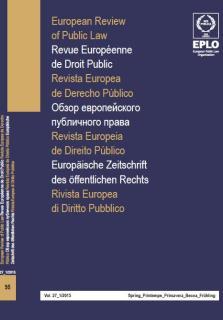
Supplementary Statement on the Current Discussion on Democratic Legitimacy and Accountability in the EU’s Economic Governance
Clemens Ladenburger
Legal Adviser and Assistant to the Director-General of the Legal Service of the European Commission, Brussels
This statement provides an overview of a discussion on democratic legitimacy and accountability in the EU’s economic governance that has been engaged since 2012 between EU institutions and Member States. It distinguishes five successive strands and stages of debate: proposing general designs for a “genuine EMU”, the enquiry on the “Troika”, the Expert Group on joint issuance of public debt, the judicial dialogue between the Bundesverfassungsgericht and the European Court of Justice on ECB action, and the politicisation of the Commission through “Spitzenkandidaten”. Key questions concern: the levels at which to strengthen parliaments (European and/or national), the shortcomings of intergovernmentalism, “democratic asymmetry” (a Parliament elected from the whole EU votes on euro area matters), optimising parliamentary legitimacy within the EU’s current institutional system, and construing the legitimacy of specialised bodies such as the ECB and EU agencies. Further euro area reform lies ahead and academia should use the time to carry the debate forward.
Ce rapport propose un aperçu de la discussion sur la légitimité démocratique et la responsabilité dans la gouvernance économique européenne qui s’est engagée depuis 2012 entre les institutions européennes et les Etats membres. Il distingue cinq volets et étapes successives du débat: proposition de concepts généraux pour une “UEM véritable”, l’enquête sur la “troïka”, le groupe d’experts sur l’émission commune de la dette publique, le dialogue judiciaire entre le Bundesverfassungsgericht et la Cour de justice de l’Union européenne sur l’action de la BCE, et la politisation de la Commission à travers les “Spitzenkandidaten”. Les questions clés concernent: les niveaux auxquels renforcer les parlements (européen et/ou nationaux), les faiblesses de l’intergouvernementalisme, l’“asymétrie démocratique” (un parlement élu par l’ensemble de l’UE décide sur des matières relatives à la zone euro), l’optimisation de la légitimité parlementaire au sein du système institutionnel européen actuel, asseoir la légitimité de corps spécialisés comme la BCE et les agences européennes. La réforme de la zone euro nous attend et l’université devrait prendre le temps de faire avancer le débat.





















